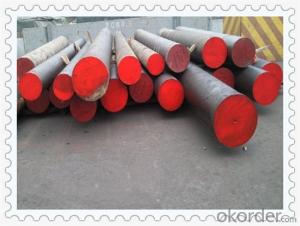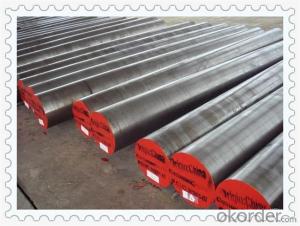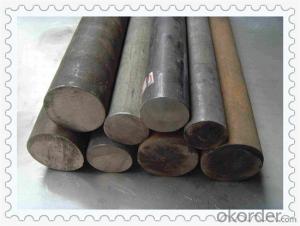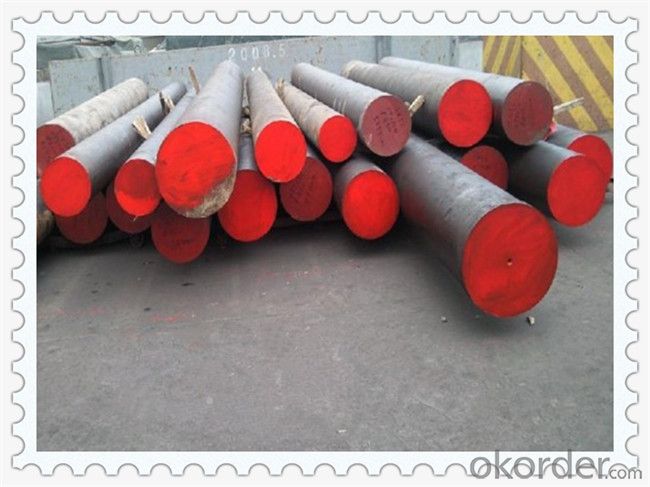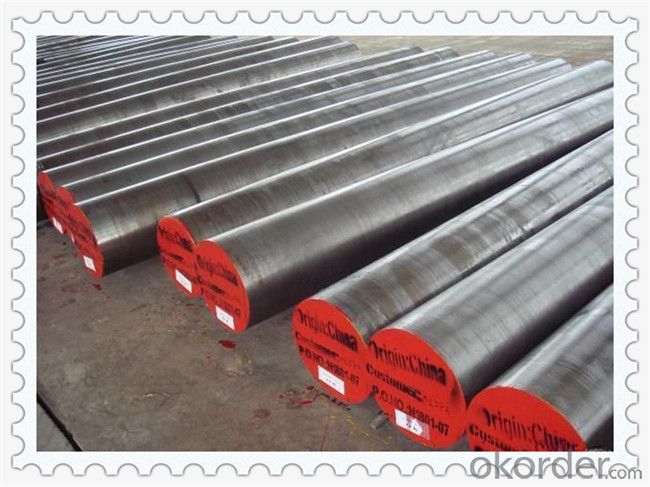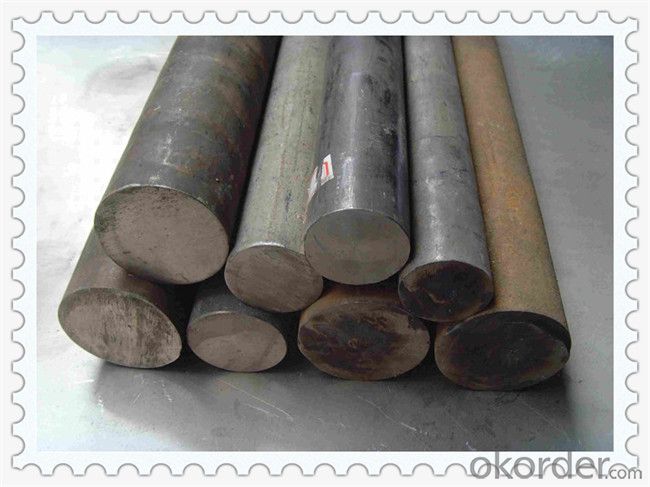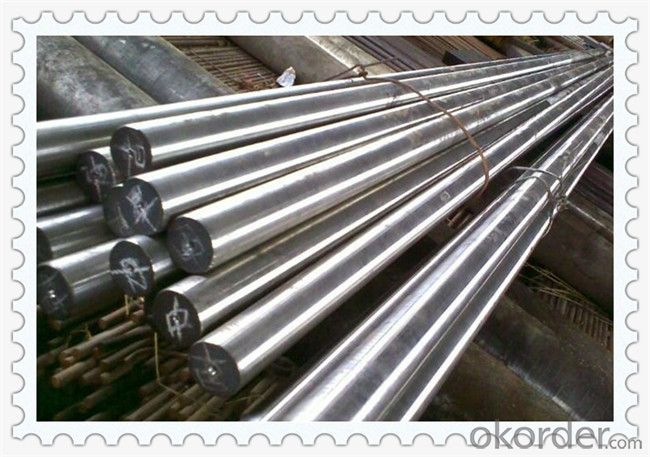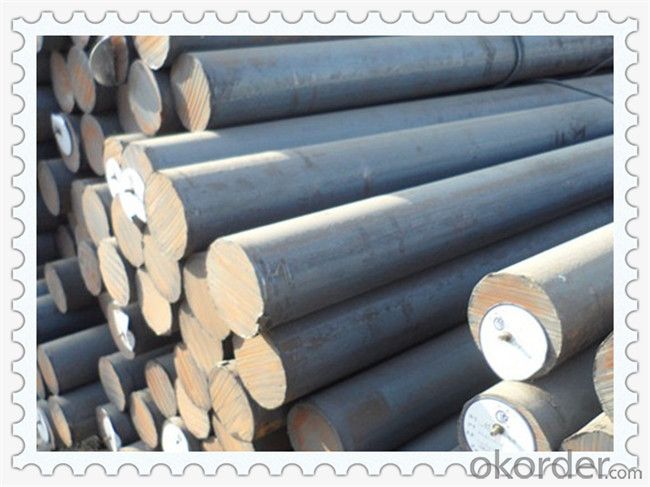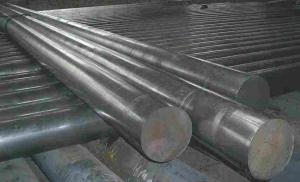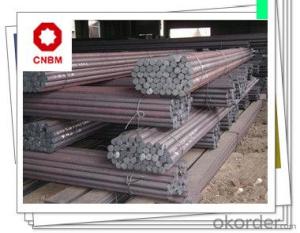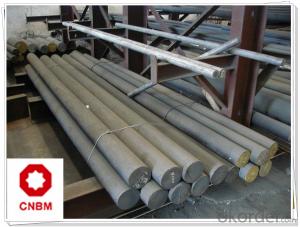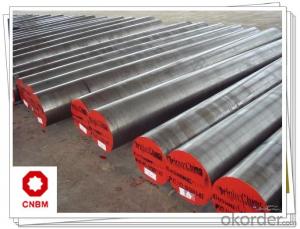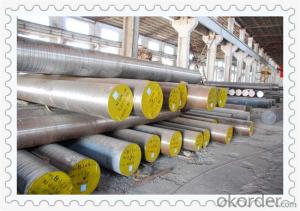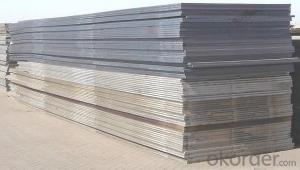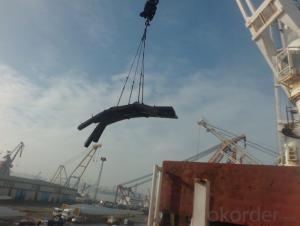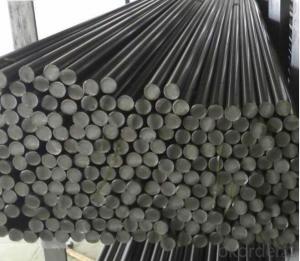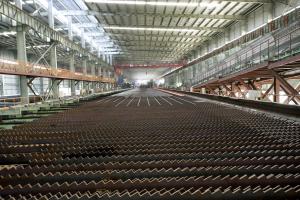Hot Rolled Alloy Carbon Structural Steel Bars
- Loading Port:
- China main port
- Payment Terms:
- TT OR LC
- Min Order Qty:
- 30 m.t.
- Supply Capability:
- 10000 m.t./month
OKorder Service Pledge
OKorder Financial Service
You Might Also Like
Hot Rolled Alloy Carbon Structural Steel Bars
Products Details
Product Name | Alloy Steel 1.2379 |
Standard | ASTM A689, JIS G4801, DIN 17221, GB/T 18254, ASTM A295, JIS G4805, etc. |
Spring steel | 65Mn, 1566, 60Si2Mn, 9260, etc. |
Bearing steel | GCr15, SAE52100, GCr15SiMn, 100CrMnSi6-4, SJU2, etc. |
Cold heading steel | ML25, ML35, etc. |
Alloy structural steel | 40CrNiMo, SAE4330, 42CrMo, 15Cr2Ni2, 40CrNi2Mo, 35CrMoV, 12Cr1MoV, ASTM4130, SCM420, 40CrV, etc. |
Military steel | 20Cr2Ni4A, 18Cr2Ni4WA, 23CrNiMo7-4-7, etc. |
Heat resistant steel | 5CrNiMoV, 4Cr10Si2Mo, etc. |
Mold and tool steel | SKD62, Cr12, 31CrMoV9, H11, 4Cr5MoSiV1, SKD61, DIN1.2344, H13, 35CrMoV, Cr12Mo1V1, SKD11, X153CrMoV12, D2, O1, DIN1.2510, P20, DIN1.2311, 3Cr2Mo, 9CrWMn, 4Cr13, AISI420, DIN1.2083, Cr12MoV, DIN1.2601, P20+Ni, Cr8Mo2SiV, DC53, DIN1.2738, etc. |
Gear steel | ASTM8620, SAE4340, SNCM430, 40CrNiMo, etc. |
Size | Round bar: 15-1200mm Square bar: 80-800mm |
Length | 2-12m, as customers' requirement. |
Melting process | EAF+LF+VD |
Ultrasonic testing | SEP1921-84 C/C, D/D, E/E |
Surface treatment | Black, grinded, peeled, polished are available |
Delivery condition | Annealing, tempering, quenching + tempering |
Technique | hot rolled, cold drawn, forged are available |
Package | Standard seaworthy packing, as customers’ requirement |
Delivery Time | 30 days after receipt of the deposit, negotiable. |
Available Sizes
Grade | Size (mm) | ||||
Round rolled steel (Dia.) | Flat rolled steel | Round forged steel (Dia.) | Square forged steel | Bright bar (Dia.) | |
High-quality carbon structural steel | 16-320 | 5-38 44-150 | 120-900 | 100-750 | 12-150 |
Alloy structural steel | 16-320 | 5-38 44-150 | 120-900 | 100-750 | 12-150 |
Carbon tool steel | 16-320 | 5-38 44-150 | 120-350 | 100-310 | 12-150 |
Alloy tool steel | 30-90 | 100-900 | 100-750 | 12-150 | |
High speed tool steel | 80-120 | 80-110 | 12-150 | ||
Bearing steel | 16-320 | 5-38 44-150 | 120-300 | 100-600 | 12-150 |
Spring steel | 14-180 | 5-38 44-150 | 120-300 | 100-260 | 12-150 |
Stainless steel | 16-250 | 120-750 | 120-600 | 12-150 | |
High temperature alloy steel | 55-200 | 80-200 | 12-150 | ||
Free-cutting steel | 14-250 | 120-400 | 12-150 | ||
Gear steel | 16-320 | 5-38 44-150 | 120-900 | 15-150 | |
Products Show
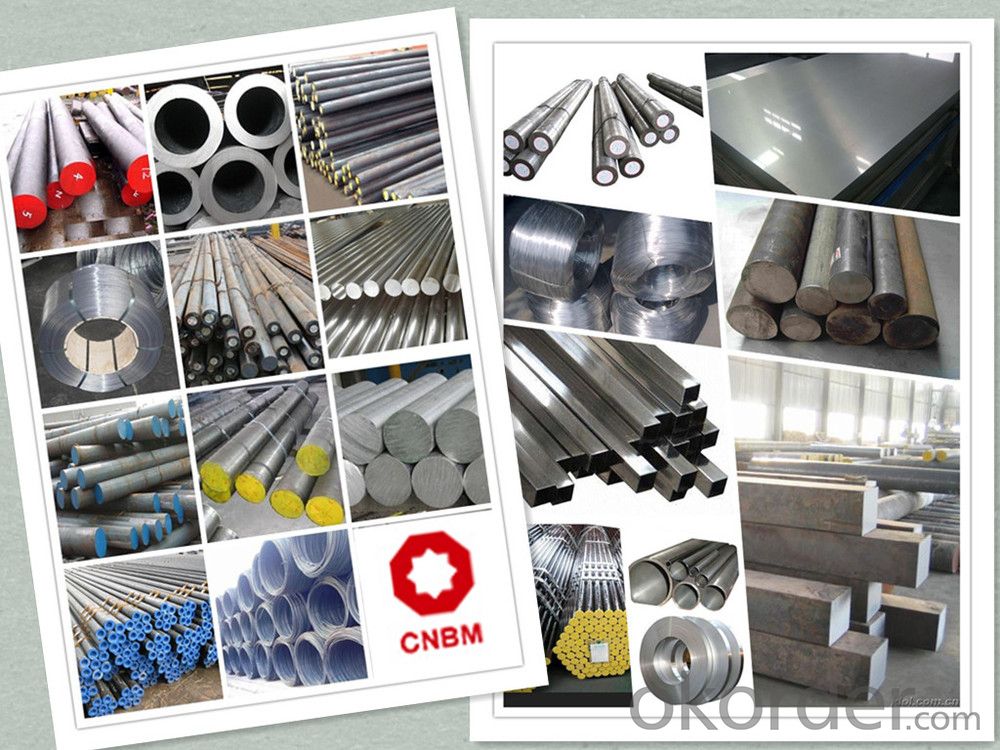
Product Overviews
| Product Name | Typical Grades | Diameter(mm) | Standard adopted |
| Carbon Steel | 20 (1020/S20C/C22) | Ø16-Ø300 |
GB/SAE/JIS/DIN
|
| 40 (1040/S40C/C40) | |||
| 45 (1045/S45C/C45) | |||
| Bearing Steel | GCr9 (51100/SUJ1) | Ø12-Ø250 | |
| GCr15 (52100/SUJ2/100Gr6) | |||
| GCr9SiMn (A485-Gr.1/SUJ3) | |||
Cr-Mo Steel | 20Cr (5120/SCr420H/20Cr4) | Ø12-Ø250 | |
| 40Cr (5140/SCr440/41Cr4) | |||
| 42CrMo(4140/SCM440/42CrMo4) | |||
| Gear Steel | 20CrNiMo | Ø16-Ø600 | |
| 20CrMn(5115/SMnC420/20MnCr5) | |||
| 20CrNiMo(8620/SNCM220/20CrMiMo2) |
Application
| Carbon Steel | Mold bottom, Plastic mold, Construction machinery parts Automobile parts, Security grills, Screens, Construction |
| Bearing Steel | Aerospace, Navigation, Nuclear energy, Chemical industry Electronic information, Petrochemical, Instrument and meter Transportation |
| Cr-Mo Steel | Mechanism & Fasteners gear, Stressed components for vehicles Engines and machines, Parts of larger cross-section |
| Gear Steel | All kinds of gears, Statically and dynamically stressed component for vehicles Engines and machine, Larger cross-section parts, Crankshafts |
Work Shop
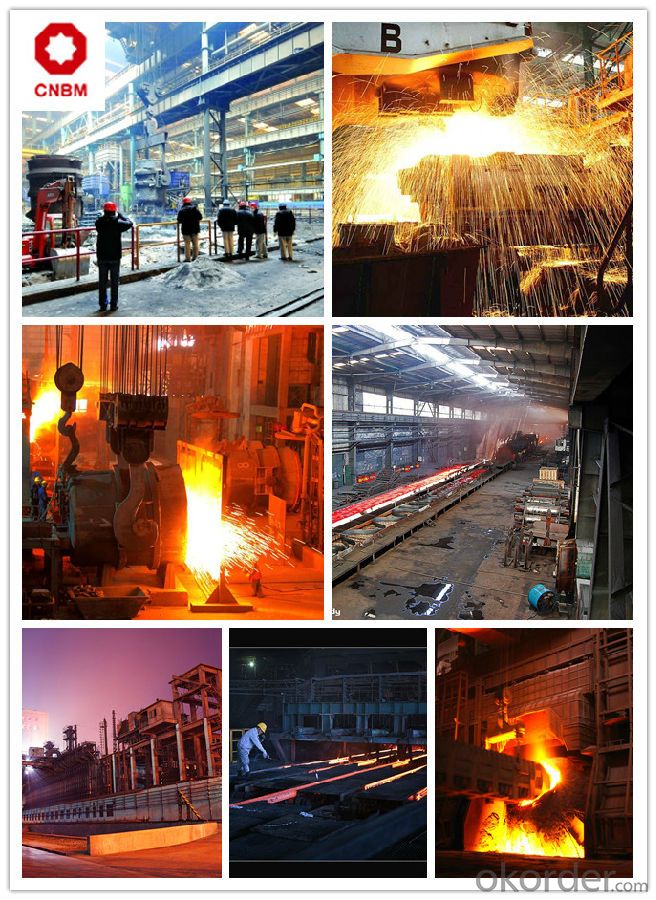
Company Information
CNBM International Corporation is the most important trading platform of CNBM group.
Whith its advantages, CNBM International are mainly concentrate on Cement, Glass, Iron and Steel, Ceramics industries and devotes herself for supplying high qulity series of refractories as well as technical consultancies and logistics solutions.

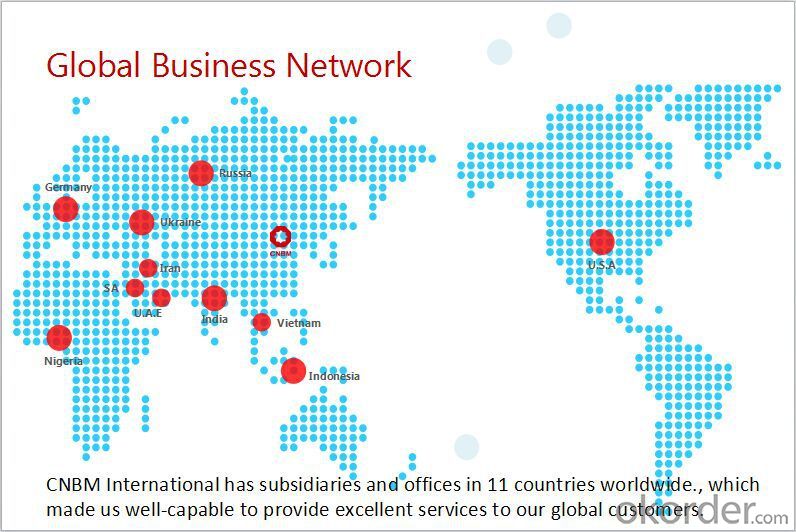
FAQ
1, Your advantages?
professional products inquiry, products knowledge train (for agents), smooth goods delivery, excellent customer solution proposale
2, Test & Certificate?
SGS test is available, customer inspection before shipping is welcome, third party inspection is no problem
3, Factory or Trading Company?
CNBM is a trading company but we have so many protocol factories and CNBM works as a trading department of these factories. Also CNBM is the holding company of many factories.
4, Payment Terms?
30% TT as deposit and 70% before delivery.
Irrevocable L/C at sight.
5, Trading Terms?
EXW, FOB, CIF, FFR, CNF
6, After-sale Service?
CNBM provides the services and support you need for every step of our cooperation. We're the business partner you can trust.
For any problem, please kindly contact us at any your convenient time.
We'll reply you in our first priority within 24 hours.
Packaging & Delivery
1, Packaging: seaworthy package or as required
2, Delivery: 35-45 days or based on quantity
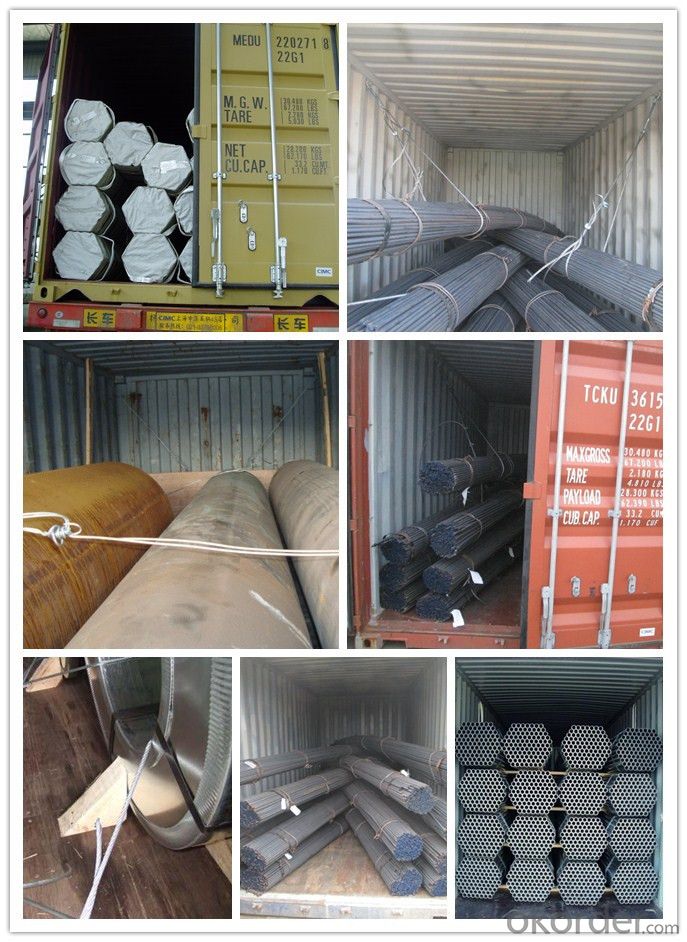
- Q: What are the different methods of cutting steel round bars?
- Cutting steel round bars can be achieved through several methods, each with their own advantages and limitations. Among the commonly utilized techniques are: 1. Abrasive cutting: By utilizing a rotating abrasive wheel, the steel round bar can be ground down. Despite its speed and efficiency, this method often results in a rough cut surface and generates significant heat. 2. Bandsaw cutting: Steel round bars can be sliced using bandsaw machines, which feature a continuous band of toothed metal rotating around two wheels. Although bandsaws provide precise and smooth cuts, they tend to be slower compared to alternative methods. 3. Cold saw cutting: Cold saws are designed specifically for cutting metal, including steel round bars. These saws employ circular blades with teeth that are specially crafted to withstand the hardness of steel. While cold saws guarantee clean and accurate cuts, they generally operate at a slower pace than abrasive or bandsaw cutting. 4. Plasma cutting: Ideal for thicker steel round bars, plasma cutting involves using a focused jet of ionized gas to melt and remove the metal. This method yields precise and clean cuts, but necessitates specialized equipment and can be more costly than other techniques. 5. Laser cutting: Laser cutting employs a high-powered laser beam to melt and vaporize the metal, resulting in precise and clean cuts. This versatile method can be utilized for steel round bars of varying thicknesses, but it does require expensive equipment and may not be suitable for all applications. Ultimately, the chosen cutting method relies on several factors, including the thickness and hardness of the steel round bar, the desired cut quality, the availability of equipment, and the specific project requirements.
- Q: What is the difference between 40Cr round steel and 40Cr forging parts?
- But 40Cr forgings are objects that are subjected to pressure by plastic deformation to shape a desired shape or suitable compressive force. (usually done by using hammers or pressure). The casting process constructed a fine grain structure and improved the physical properties of the metal.
- Q: What are the advantages of using structural steel round bars?
- There are several advantages of using structural steel round bars. Firstly, they provide excellent strength and durability, making them suitable for various structural applications. Additionally, their round shape allows for easy fabrication and installation, reducing construction time and costs. Steel round bars also have a high resistance to corrosion and can withstand extreme weather conditions. Moreover, they offer versatility in design as they can be easily bent, shaped, and welded to meet specific project requirements. Lastly, steel round bars are widely available and can be recycled, making them a sustainable choice for construction projects.
- Q: Are steel round bars available in custom sizes?
- Indeed, one can find steel round bars in custom sizes. Steel manufacturers and suppliers have the capability to produce round bars according to precise size demands and specifications. It is possible to make requests for custom sizes based on the diameter, length, and overall dimensions of the round bar. Whether it is for a particular project or application, numerous steel manufacturers and suppliers provide the opportunity to tailor the size of round bars to cater to individual requirements.
- Q: Can steel round bars be hot worked?
- Yes, steel round bars can be hot worked. Hot working refers to the process of shaping or forming steel while it is at an elevated temperature. This temperature is typically above the recrystallization temperature of the steel, which allows for easier deformation and shaping. Hot working of steel round bars can be done through processes such as hot rolling, hot forging, or hot extrusion. These processes involve applying heat to the steel bar and then using mechanical force to shape it into the desired form. Hot working is commonly used in the manufacturing of various steel products, including round bars, to improve their mechanical properties and achieve specific shapes or sizes.
- Q: Can steel round bars be used in the manufacturing of couplings?
- Yes, steel round bars can be used in the manufacturing of couplings.
- Q: What are the different types of steel used to make round bars?
- The production of round bars involves the utilization of various types of steel. The selection of steel depends on the desired characteristics and applications of the round bars. Carbon steel is a commonly utilized steel for round bars due to its remarkable strength and durability. It finds extensive use in construction, machinery, and automotive components, where a sturdy and inflexible material is required. Stainless steel is another type of steel employed for round bars. It is renowned for its ability to resist corrosion and withstand high temperatures. Applications that necessitate resistance to moisture, chemicals, and heat, such as food processing equipment, medical devices, and architectural structures, often employ stainless steel. Alloy steel, which is formed by combining iron with other elements like manganese, chromium, and nickel, is also used for round bars. This blending enhances its properties, resulting in improved strength, hardness, and resistance to wear and tear. Aerospace components, automotive parts, and machinery often employ alloy steel round bars due to their high strength and toughness. Tool steel, designed specifically for the production of tools and dies, is another type of steel used for round bars. It is renowned for its high hardness, wear resistance, and ability to maintain a sharp cutting edge. Tool steel round bars are commonly employed in applications involving cutting, shaping, and forming, such as drills, punches, and molds. In conclusion, the choice of steel for round bars is determined by specific application requirements, including factors such as strength, corrosion resistance, heat resistance, and wear resistance.
- Q: Can steel round bars be used for tooling applications?
- Tooling applications can indeed utilize steel round bars. Steel, being a highly versatile material, possesses exceptional strength, durability, and resistance to wear and tear. By machining, heat treating, and shaping round bars made of steel, one can create a wide range of tools, including punches, dies, drills, and lathe tools. The round shape of these bars facilitates effortless machining and shaping processes. Moreover, the performance of steel round bars in specific tooling applications can be further enhanced through surface treatments or coatings. All in all, due to their outstanding mechanical properties and adaptability, steel round bars find widespread application in tooling.
- Q: How do steel round bars perform in high-temperature environments?
- Steel round bars generally perform well in high-temperature environments. The performance of steel round bars in high-temperature conditions can be attributed to their high melting point and excellent heat resistance properties. Steel has a relatively high melting point compared to other materials, allowing it to withstand elevated temperatures without losing its structural integrity. Furthermore, steel round bars possess excellent thermal conductivity, which allows them to dissipate heat efficiently, minimizing the risk of deformation or structural failure. This property makes steel round bars suitable for applications where heat is generated, such as in industrial processes or high-temperature equipment. In addition to its high melting point and thermal conductivity, steel also demonstrates good mechanical strength at high temperatures. It retains its load-bearing capacity and dimensional stability, ensuring that it can withstand the stresses and strains imposed on it in high-temperature environments. However, it is important to note that the performance of steel round bars in high-temperature conditions may be influenced by the specific grade of steel used. Different grades of steel have varying compositions and alloying elements which can affect their performance at elevated temperatures. It is crucial to select the appropriate grade of steel that is specifically designed for high-temperature applications to ensure optimal performance and longevity. Overall, steel round bars are a reliable and durable choice for use in high-temperature environments due to their high melting point, excellent thermal conductivity, and mechanical strength.
- Q: What are the different types of steel round bar coatings used in the automotive industry?
- There are several different types of steel round bar coatings that are commonly used in the automotive industry. These coatings are applied to the steel bars to enhance their durability, corrosion resistance, and overall performance. 1. Galvanized Coating: This is one of the most widely used coatings for steel round bars in the automotive industry. Galvanized coating involves applying a layer of zinc to the surface of the steel bar. This coating provides excellent corrosion resistance, protecting the steel from rust and other forms of degradation. 2. Epoxy Coating: Epoxy coatings are often used in automotive applications that require high chemical resistance. This type of coating provides a protective barrier against chemicals, moisture, and other corrosive substances. Epoxy coatings also have excellent adhesion properties, ensuring long-lasting performance. 3. Powder Coating: Powder coating is a popular choice for steel round bars in the automotive industry due to its durability and aesthetic appeal. This coating involves applying a dry powder to the surface of the steel bar, which is then heated to create a tough, protective layer. Powder coatings come in a wide range of colors and finishes, allowing for customization and branding opportunities. 4. Ceramic Coating: Ceramic coatings offer exceptional heat resistance, making them ideal for automotive applications that involve high temperatures. This type of coating provides a protective barrier that prevents heat damage and improves the overall lifespan of the steel round bars. 5. Phosphate Coating: Phosphate coatings are often used as a pre-treatment before applying other types of coatings. This coating improves the adhesion of subsequent coatings and provides additional corrosion resistance. Phosphate coatings also enhance the lubricity of the steel bar, reducing friction and wear. These are just a few examples of the different types of steel round bar coatings used in the automotive industry. Each coating offers unique benefits and is chosen based on the specific requirements of the application. Overall, these coatings play a crucial role in improving the performance and longevity of steel round bars in automotive applications.
Send your message to us
Hot Rolled Alloy Carbon Structural Steel Bars
- Loading Port:
- China main port
- Payment Terms:
- TT OR LC
- Min Order Qty:
- 30 m.t.
- Supply Capability:
- 10000 m.t./month
OKorder Service Pledge
OKorder Financial Service
Similar products
Hot products
Hot Searches
Related keywords
